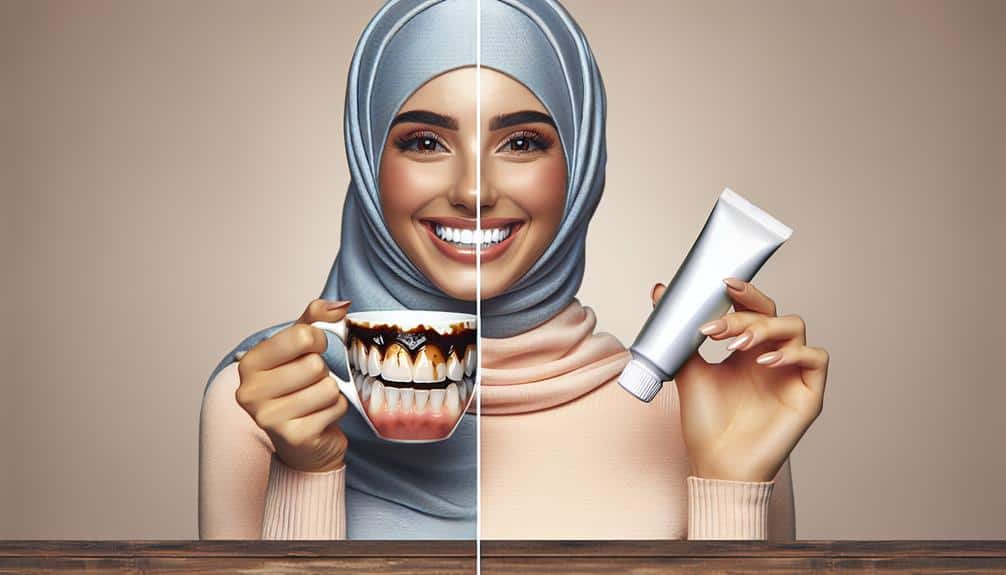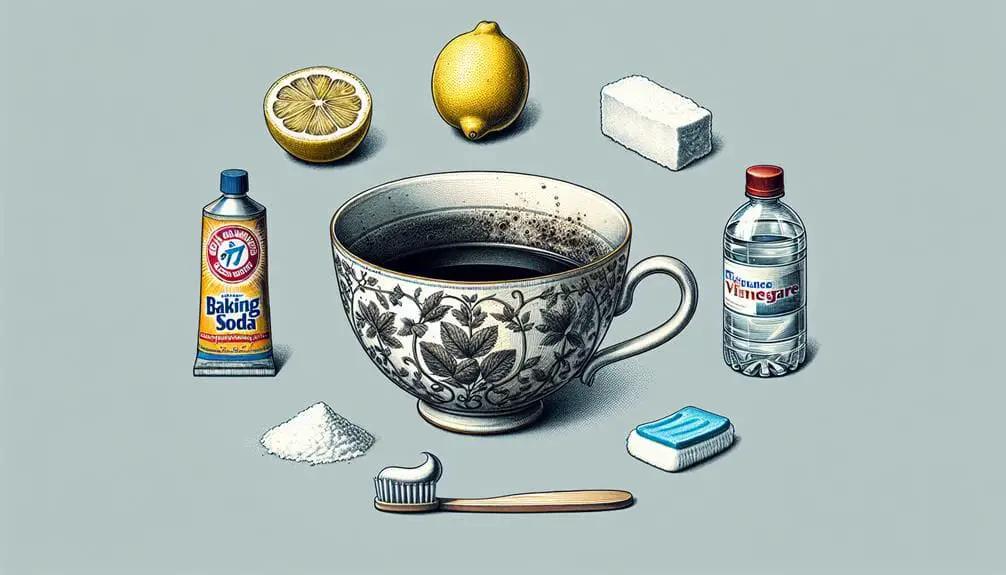To effectively remove tea stains on your teeth, consider seeking professional help. In-office treatments can provide quick results by targeting deep-set stains. Custom trays tailored to your needs offer consistent whitening. Lifestyle changes like avoiding staining foods, ample water intake, and regular dental check-ups play a key role in maintaining whiter teeth. To make results last, limit stain-causing foods, brush with whitening toothpaste, floss daily, and use whitening mouthwash. By implementing these expert tips and guidance, you can achieve a brighter smile and healthier teeth.
Key Points
- Professional whitening treatments target deep-set tea stains effectively.
- Custom trays provide consistent and tailored whitening solutions for individual needs.
- In-office treatments offer quick and noticeable results for removing tea stains.
- Supervised by dental professionals to ensure safety during the whitening process.
- Professional-grade whitening solutions are designed to tackle stubborn tea stains.
Causes of Tea Stains on Teeth
Tea stains on teeth are primarily caused by the tannins present in tea, which have a natural affinity for tooth enamel. Tannins are a type of polyphenol compound that can lead to discoloration over time. These compounds are more concentrated in black tea compared to other types of tea, making black tea a more significant culprit in staining teeth.
Preventive measures can be taken to reduce the impact of tea stains. One essential strategy is to maintain good oral hygiene practices, such as brushing your teeth twice a day and flossing regularly. Additionally, being mindful of your dietary habits can help prevent tea stains. Rinsing your mouth with water after consuming tea can help wash away some of the tannins before they have a chance to adhere to your enamel. Avoiding excessive consumption of tea or using a straw to drink tea can also reduce the contact between the tannins and your teeth, ultimately decreasing the likelihood of staining.
DIY Remedies for Tea Stains
To combat tea stains on your teeth, consider trying out some do-it-yourself remedies that can help restore your smile to its natural brightness. Natural remedies and home solutions can be effective in tackling mild to moderate tea stains.
One popular method is using baking soda, which acts as a mild abrasive to gently scrub away surface stains. Create a paste by mixing baking soda with a small amount of water and brush your teeth with it a few times a week.
Another option is coconut oil pulling, where swishing coconut oil around in your mouth for about 15-20 minutes each day may help reduce stains over time.
Additionally, rubbing a small amount of lemon juice or apple cider vinegar on your teeth using a cotton swab can help break down stains, but be cautious as these are acidic and may erode your enamel if used too frequently. These natural remedies can complement your regular oral hygiene routine and contribute to a brighter smile.
Professional Whitening Options
Consider professional whitening options from your dentist to effectively remove stubborn tea stains and achieve a brighter, whiter smile. In-office treatments are a popular choice for those seeking quick and noticeable results. Your dentist will apply a professional-grade whitening solution to your teeth, accelerating the whitening process and targeting deep-set stains caused by tea consumption. These treatments are safe, efficient, and supervised by dental professionals to guarantee the best outcome for your smile.
Another professional whitening option to combat tea stains is through custom trays. Your dentist will take impressions of your teeth to create personalized trays that fit your mouth perfectly. These trays are then filled with a whitening gel prescribed by your dentist and worn at home for a specified amount of time each day. Custom trays allow for consistent whitening results and are a convenient way to address tea stains while being tailored to your specific needs.
Lifestyle Changes for Whiter Teeth
For achieving whiter teeth, making simple lifestyle changes can greatly contribute to improving the overall brightness of your smile. Here are some expert tips to help you enhance the whiteness of your teeth through lifestyle adjustments:
- Diet Changes: Consuming less staining foods and beverages such as tea, coffee, and red wine can prevent further discoloration of your teeth.
- Oral Hygiene: Maintaining a consistent oral hygiene routine by brushing your teeth at least twice a day and flossing daily can help prevent plaque buildup and keep your teeth looking whiter.
- Hydration: Drinking plenty of water throughout the day helps wash away food particles and reduces the likelihood of stains settling on your teeth.
- Avoid Tobacco: Quitting smoking or chewing tobacco not only improves your overall health but also prevents yellowing and staining of your teeth.
- Regular Dental Check-ups: Visiting your dentist for regular cleanings and check-ups can help detect any early signs of staining and address them promptly for a brighter smile.
Maintenance Tips for Lasting Results
Keep your teeth's brightness with these effective tips to guarantee long-lasting results.
To maintain a white smile after removing tea stains, consider preventive measures as your first line of defense. Avoiding or limiting foods and beverages known to cause staining, such as tea, coffee, and red wine, can greatly prolong the effects of your stain removal efforts.
Regular dental hygiene routines are vital for long-term solutions. Brush your teeth at least twice a day with a whitening toothpaste to prevent new stains from setting in. Flossing daily helps remove plaque and prevent discoloration between teeth.
Additionally, consider using a whitening mouthwash to preserve your teeth's brightness. Visiting your dentist for professional cleanings every six months is essential in keeping your smile radiant.
These maintenance tips, when combined with your newly acquired habits from removing tea stains, will make sure that your teeth remain white and stain-free for the long haul.
Frequently Asked Questions
Can Tea Stains on Teeth Be Prevented by Using a Straw While Drinking Tea?
When sipping tea through a straw, some liquid bypasses teeth, potentially minimizing stains. However, for thorough dental care, prioritize regular dental visits, mouthwash use, and impeccable dental hygiene practices to prevent tea stains effectively.
How Long Does It Take for Professional Whitening Options to Show Results in Removing Tea Stains on Teeth?
For professional whitening options to remove tea stains on teeth, results typically show within a few weeks. Comparing to natural remedies, professional whitening offers quicker and more noticeable improvements in whitening timeline and overall results.
Are There Any Specific Foods or Drinks That Should Be Avoided to Prevent Tea Stains on Teeth From Recurring?
To prevent tea stains on teeth from coming back, avoid dark beverages like tea and coffee. Swap them for tea alternatives like herbal teas. Maintain good oral hygiene with regular dental care and consider lifestyle changes for a brighter smile.
Are There Any Specific Toothpaste or Mouthwash Products That Are Effective in Removing Tea Stains on Teeth?
To remove tea stains on teeth effectively, choose toothpaste with whitening agents like baking soda or hydrogen peroxide. Opt for mouthwash targeting stains, containing fluoride to strengthen enamel. Consistent use and proper brushing technique are key for tea stain prevention.
How Often Should Professional Whitening Treatments Be Done to Maintain a White Smile and Prevent Tea Stains From Reoccurring?
For maintaining a dazzling smile and preventing tea stains, professional whitening treatments should be done every 6-12 months. This frequency guarantees longevity in whitening effects and helps to combat tea stains effectively. Consistent care is crucial.



